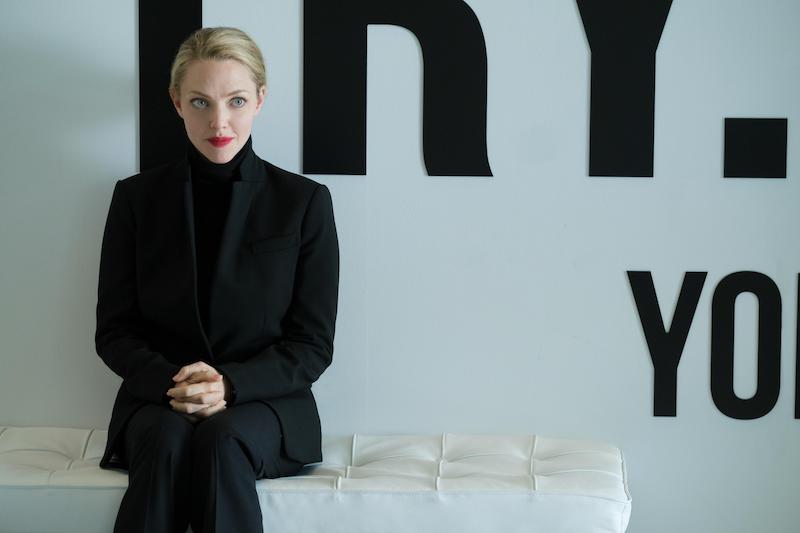
In 2003, Elizabeth Holmes had an idea that could change the world. In 2015, the world found out her idea was impossible. Hulu’s new series The Dropout takes place largely in the time in between, focusing on the meticulously built house of cards on which doomed biomedical company Theranos was built. It’s a strangely enthralling character study that works thanks to its committed lead performance.
Amanda Seyfried plays Holmes, the single-minded inventor who tried to create a mobile medical testing system that only required one drop of blood. It’s fitting that her invention features a blood sacrifice because, in The Dropout, she seems to see herself as some sort of god. She’s a tricky character to get a hold of, perhaps in part because of gaps in public knowledge. But Seyfried plays her with precision, somehow disappearing into a role that doesn’t require much physical change.
The Dropout is quite good, but mostly in the sense that it is novel. And its novelty comes almost entirely from Holmes’ strangeness. We see formative moments in her life, from her dad crying about the promise she showed at seven years old, to her mom telling her to compartmentalize her college sexual assault to survive. Yet nothing we see quite explains what Holmes becomes. She practices basic conversation in the mirror throughout the series, pushing her voice to a lower register each time. She dances in a freestyle flail to hip hop songs, then later claims she never dances. The CEO is eccentric, but she’s also determined and apparently unconcerned with morality. The result is a compelling, borderline frightening figure who’s also utterly unrelatable.
The story of Theranos will likely be familiar for many viewers. The Dropout is based on the popular investigative podcast of the same name. And the story has also been depicted in the documentary The Inventor: Out for Blood in Silicon Valley. For the uninitiated, it goes something like this: Holmes created Theranos, courted investors, promised big, and even launched a partnership with Walgreens, all without ever delivering a working product. Theranos’ path to success, and then ruin, is riddled with faked demos, cherry-picked data, and full-blown cover-ups. While other ripped-from-the-headlines limited series intentionally blur their central figures’ level of involvement in an attempt to remain diplomatic, The Dropout implicates Holmes at every turn.
The series starts with Holmes as its protagonist, but as her decision-making gets more opaque, it eventually shifts its focus to tertiary figures in her story. The supporting cast is strong, from Stephen Fry as noble chief scientist Ian Gibbons, to Dylan Minnette and Camryn Mi-Young Kim as a pair of interns who feel compelled to speak up about the corner-cutting they witness in the lab. Eventually, a small army of people who don’t buy what Holmes is selling emerges, led by practical Stanford professor Phyllis Gardner (Laurie Metcalf) and a frustrated family friend, inventor Richard Fuisz (William H. Macy). The Dropout is muted, with few emotional high points to speak of, but it’s wise to re-center the action around people whose motivations make more sense than the protagonist.
This gets to the root of The Dropout’s only problem: it has no emotional anchor. Holmes’ story is one of relentless single-mindedness. She tries to follow a narrative of success that doesn’t actually exist, frequently citing the names of famous start-up CEOs without acknowledging the actual work those people put in. Her plan for world domination seems to involve two steps: dropping out of college and making people believe in her. While her vision, as it exists, is clear, we never really know her from the inside out. Depending on the angle, she seems like an overconfident striver, an immature girl, or a full-blown sociopath. The Dropout does well to preserve her enigmatic core, but it also makes for a strangely distant viewing experience.
Regardless of Holmes’ own characterization, The Dropout serves as a searing indictment of start-up culture and the charm-and-greed-based machinations of Silicon Valley. Early on, Holmes clearly has trouble breaking through because she’s a woman. When she does gain power, she holds onto it for years too long for the same reason. It would be unfeminist to question the success of a woman, Holmes and others imply, even if that woman is obviously shady and has no data to support her entire endeavor. The fact that Theranos’ shoddy work and non-functional devices slipped through the cracks for so long, even getting FDA approval, shows investors’ thoughtless drive to get in on the next big thing. Theranos becomes a business based on exclusivity, secrecy, and hero worship: the show features not one, but two creepily adoring songs sung in honor of its founder.
The Dropout is thoughtful and engrossing, if occasionally remote. If it stands above its contemporaries in the rising tide of scammer-centric shows, it’s largely because of Seyfried’s performance and the series’ no-frills execution. The actress communicates Holmes’ wild-eyed ambition with a practiced smile that can’t quite mask the inventor’s awkwardness and insecurity. Seyfried wears the layers of Elizabeth Holmes with ease. As the series unfolds, its central figure remains partly unknowable, even as she grows steadily more intimidating. By the time Theranos comes crashing down, it’s clear that the only real thing this dropout has successfully built up–is her own denial.
Related Topics: Hulu

